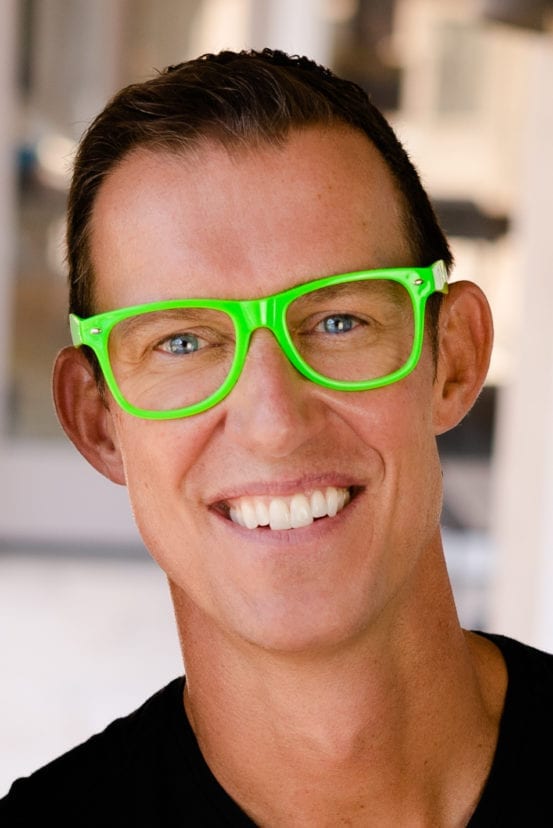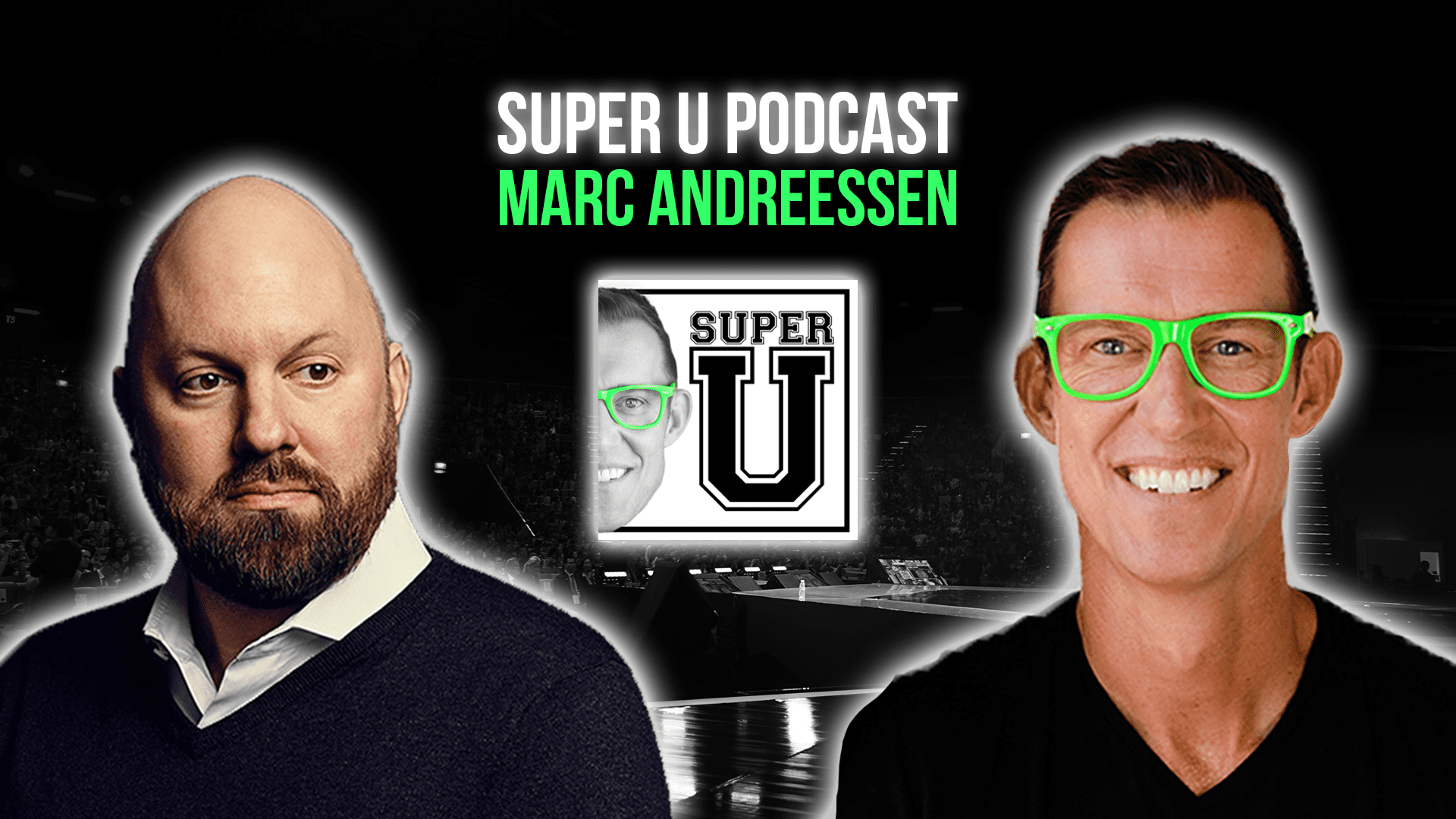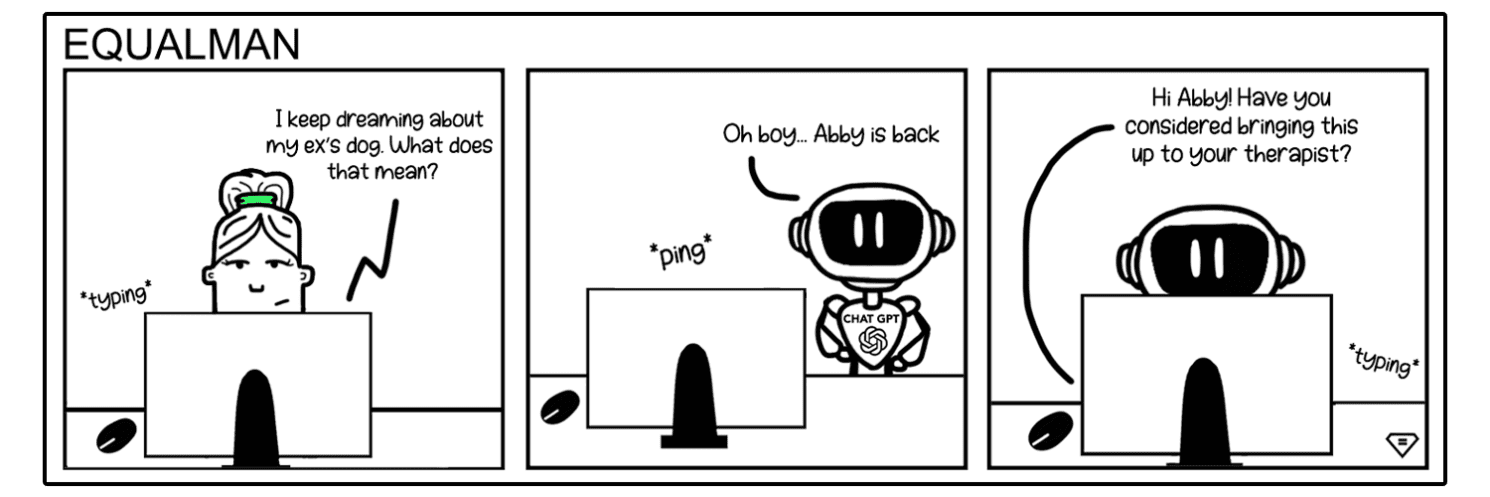Super U Podcast | 7 Super Tips with Marc Andreessen
On this episode of the Super U Podcast, Marc Andreessen, an American entrepreneur, investor, and software engineer gives us insight on successful start-ups, the importance of courage and genius, and why you should combine your skills.
5x #1 Bestselling Author and Motivational Speaker Erik Qualman has performed in over 55 countries and reached over 50 million people this past decade. He was voted the 2nd Most Likable Author in the World behind Harry Potter’s J.K. Rowling.
Need a sneak peek? Below are the main takeaways from the episode.
Super U Podcast | 7 Super Tips with Marc Andreessen:
[5:08] Tip #1
“So just in terms of thinking about what we’ve been through in the last 20 years in Silicon Valley, some people in the room are old enough, you may remember there was a bubble. And it was a fairly big deal in 1998 to 2000. And there was a very profound crash, which was deeply traumatizing for those of us who went through it. And then we’ve been through this extremely long period of basically, you know, years of pain followed by then sort of what I think is very slow recovery. I think it’s actually been an object lesson in the psychology of markets and bubbles, I think that people are much more highly sensitized to bubbles after a bubble. If you could be sensitized to them before a bubble, you can make a lot more money. But people get highly sensitized. And so there’s this phenomenon of trying to close the barn door after the horses have escaped. And that is a lot of what all the bubble talk in the last 10 years has been about. So we could talk at length about why I think tech is not now in a bubble and has not been in a bubble since 2000. The deeper, more interesting thing is it follows a historical pattern, which is what I talked about at the Goldman conference, which is based on the best thinker on this topic, an economist named Carlota Perez, who wrote a book called Technological Revolutions. That’s probably the single best book, like that book and The Innovator’s Dilemma are probably the two key books that are really critical to understanding how this industry works. And so she describes in her book a general model for the deployment of new technologies, and then how technologies intersect with financial markets. And so she’s got this whole thing. And it’s basically this multi-generational process. And there are basically these two big phases of it, there’s what’s called the “installation phase.” And there’s what’s called the “deployment phase.” And it turns out in every single case, and this includes railroads, and lots of electricity and steam engines and lots of prior new fundamental technologies, there’s always this gigantic bubble and then crash, kind of halfway through. And historically, that marks the transition from the installation phase to the deployment stage. The deployment stage, you could argue is where all the actually interesting things, how things happen, it’s where all the tech, all the new technologies actually start to work. They actually make it in everybody’s hands, they actually become cost-effective. And we find out how to actually use all these things. And so that’s the phase I think we’re in now. Without talking about the WhatsApp deal, in particular, it is interesting to note that the companies that people think are overvalued today, generally have billions of dollars in revenue, which was not the case in the 90s. For example, Facebook went from zero to $10 billion of revenue in less than 10 years. And so that is definitely not what happened in the 90s. The other thing is the companies that people debate today, for the most part, have extraordinarily high user count, market sizes have expanded gigantically. And so you’ve got these things now that people are arguing about that have, in some cases, a half-million users on their way to a billion users. And people want to take a position that you can have a large-scale internet service that’s worth a billion users, that’s not gonna be worth anything. You could take that position, I’m not sure I would recommend it.”
[8:45] Tip #2
“We started our second company Loud Cloud in September 1999. Then it was classic, it was fantastic. It was an incredibly high rapid growth rate off of a standing start straight into the last six months of the bubble. You know, unprecedented growth, covers on Wired Magazine, and we took it public in 18 months and then the world caved in, our entire business caved in. Burning an enormous amount of cash, because we had created the company for much, much higher growth and in our stock ultimately bottomed out at half of cash. So our shareholders made the judgment that not only were we so incompetent that we were not capable of justifying the amount of cash we had in the bank, but that we were certain to burn at least half of it before we would call it quits and just give them the cashback. Those are probably the dark days. And then you know, NASDAQ you know, start sending the delisting letters may send about one a day, saying if you don’t give your stock back up above $1, we’re gonna delist you, and you’ll be on the Pink Sheets. And we came within days from that. And so getting through that, and by the way, getting through that kind of thing, at the same time that it looks like the entire world is ending that it looks like you know, the tech industry will never ever recover. I think the thing that we’re most proud of is actually working our way through that.”
[10:19] Tip #3
“The general criteria for a successful high tech startup. In my view, you see different sort of rules of thumb from different people. But the three big things you always come back to are, is there a big market? And by the way, that comes in two parts. Is there a big existing market that you think you can go after and displace incumbents? Or do you believe there’ll be a new market that will be big? Is there a fundamental technology or economic change that causes you to justify having a new company? And that’s really important. The way we think about that is, is there a 10x change happening in the technology landscape, is something 10x faster, or 10x, cheaper, or 10x better? And if it’s not 10x, we view as both VCs and entrepreneurs, we really have to ask ourselves is it really worth doing? Because it’s really hard to start new companies. New companies generally shouldn’t exist. Existing companies are usually pretty good at what they do and so for a new company to exist, it not only has to, like you know, come in and go into business and bring a product to market, but it has to bring a product to market that so much better than what already exists, that it punches through the status quo. And most customers in most markets are pretty happy buying from the current suppliers. And so there has to be a real kind of edge on the thing. And we look for that in either a technology change, usually technology change, or an economic change, which are often the same thing. And then the third is the team. Is the team outstanding? And if you think about this, as an entrepreneur, it becomes a question of the founding team. You know, some companies are solo founders, and they can work but generally, you know, most of us, like myself, where human beings are mortal, you want to have a founding team of complementary skill sets. And so you want to have at least one superstar technologist, quite possibly more than one. Some of the best startups actually more than one founding technologist. And then it often helps to have somebody who’s like a product or who’s, who’s a market or salesperson or has a really good understanding of business on the team. And so we look at market product and team. And the reality is you need all three, I would say, interestingly, if you’re going to compromise as an investor, if we’re going to compromise on one of those, that would actually be the product. And the reason I say that is because a great market is a lot easier to make up for with iterative product execution, than a poor market because the problem with a poor market a small market is even if you do a great job on the product, there just aren’t that many customers it’s hard to ever get big.”
[12:53] Tip #4
“At the heart of it, there are two things that we look really, really hard for. I mean, there’s the surface-level stuff you look for, you look for a huge market, you look for differentiating technology, and you look for incredible people… I think we probably we spent a lot of time talking about markets and technology. And we have lots of opinions and I’m not sure that those opinions are actually all that relevant all that often. I think probably the decision ultimately is and should be around people. As like 90% of the decision. The two things we really zero in on people are, they sound simple, they end up being very difficult– courage and genius. Courage is the one we talk about a lot because it’s the one that people can learn. You know, courage, which is to say not giving up in the face of adversity. Just being absolutely determined to succeed you know, is something that you can like force yourself to do. It can be very painful, but you can force yourself to do it. The genius part is a little bit hard to force yourself to do, you know. Courage without genius might not get you where you need to go but genius without courage almost certainly won’t. And so we’re looking for some kind of magic combination of genius and courage. You know, one of my partners quotes Nietzsche a lot on the south. He says it’s, “It’s a world of power. It’s people who simply will not stop.” And by the way, there’s always been this kind of thing in Silicon Valley of like, you know, I called the failure fetish, right? And failure is good, right? Failure to you guys are probably all been taught this, heard about this. A lot of people look at failure as a wonderful thing. Failure teaches you all this stuff. And it’s great to fail a lot. And we don’t buy any of that. We think that’s all complete, complete nonsense. We think failure sucks. We think failure is a terribly terribly depressing thing to go through. We think success, on the other hand, is wonderful. You wouldn’t think that this is something you have to actually say out loud, but we do find it to be clarifying when we point it out and so we are strongly biased towards people who are so determined to succeed that they just never give up. They never quit. And I think that is a huge part of it. And that’s something we really looked at. We looked deeply for, and you know, that’s the kind of thing that’s not listed on a resume, right? That’s something that has to be deepened. Somebody fundamentally deepened somebody’s character, and you have to see it in their backgrounds.”
[15:46] Tip #5
“I think our company systematically are too weak on helping people evolve in their careers and develop new skills. And I think that same thing is true across the entire economy, and you almost can’t be too good at it. The classic example, [in] the valley right now everybody needs mobile iOS programmers. And so everybody’s out trying to recruit the same, it feels like there’s only 3000 iOS programmers in the valley, and everybody’s trying to recruit them all. Well, you’ve got in a lot of these companies, Java programmers, you’ve got PHP programmers, you’ve got web programmers, it’s like, take four months and, there’s a training company we work with called Big Nerd Ranch. And they’re spectacular. It’s Big Nerd Ranch, it’s like where you send people off, and they train them to be iOS programmers at the Big Nerd Ranch. And, yeah, everybody’s brain is pointing to somebody who’s been there. And so, you know, train people up on how to do these things. We have another company called Udacity, that does this kind of training now online and is rolling out all these tracks to be able to train people how to do mobile development, or how to train people how to do data science. And so I think that that development, career path, skills training is going to be a more fundamental part of how the economy works and I think it has to be.”
[17:46] Tip #6
“Cities have always played this magical role, in how civilization develops. And if anybody who, like I did, if you grew up in the country moved to the city, you kind of see this really clearly, which is like the big difference between growing up in the country and growing up in the city is in the city, you’ve got all these people kind of slamming together, and you’ve got all these things that happen when people slam together, including things that people don’t like. But you get ideas combining, right, and you get teams forming, and you literally get increases in productivity, growth, economic growth, you get new idea formation. And it’s really where art comes from. It’s where culture comes from, it’s where fashion comes from, it’s where technology comes from, as it is getting people together. And so this idea, you know, kind of my single biggest idea is that the internet will be a city. And the internet will be the place where everybody can come together, and everybody can combine. And then you combine that with my other kind of favorite idea, which I call suffering, it’s the world which is basically, over the next 20 years, many different fields of human activity, and business and culture and creativity, are going to go from being not software to being software, right. And actually, it’s happening right now in transportation as a great example. The car 40 years ago, was a mechanical device with a battery. The car today has like 200 microprocessors in it, and has computer controls throughout the whole thing. And the car in five years, you’re not going to drive because it’s gonna drive itself. And so the car becomes a rolling computer, right? It’s got many of the same components increasingly, as a laptop computer, and the software complexity and the thing just explodes. And then it can drive itself. And then, by the way of a self-driving car, you can then recreate the entire idea of what a car is. And you can completely change the whole idea of what it means to travel. And so it’s a process basically, the way I think about it, it’s a process of software kind of colonizing the car taking over the car. And I think over 20 years, I think software takes over biology to software takes over healthcare software takes over education, which is a big basis for our Udacity investment software takes over financial services, you just you kind of trip more and more things over into being code and being software…”
[20:59] Tip #7
“So the single biggest piece of career advice that I’ve ever heard that I realized after the fact I was implementing, I didn’t realize it at the time was actually Scott Adams, the guy who invented Dilbert. Easy to remember who came up with this piece of advice, because how many people invented Dilbert? His big advice was, “It’s not about any particular skill, it’s about combining skills.” The world is becoming an ever more complicated place, everything is slamming together. Fields that used to be discrete are now combining. Due to a large part of what we’ve been talking about. And so it’s not about any individual skill, it’s about combining skills, and then constantly layering in new skills. And so, the great example is you can be an engineer, and you can manage your track, you could be a writer, be a professional writer. But what if you’re an engineer with writing skills? And then you can be the engineer who can then actually articulate what engineers do, which might be helpful. Or you could be a writer, right? Who understands engineering culture, and you could write books about technology, right. And all of a sudden, like, both of those are like highly differentiated skills like those are very special skills. And then what if on top of that, you thread it in the knowledge of education, and then you have the ability to write about technology and education, and all of a sudden, that’s a very special thing. And then basically, through the course of your life, you just keep layering in you just keep you keep layering in more and more skills…”
Click here to subscribe and listen to the full episode.
Connect with Marc Andreessen:
Website: https://www.forbes.com/profile/marc-andreessen/
Twitter: @pmarca

To ensure you don’t miss future episodes, subscribe to our podcast by clicking here >> Super U Podcast. We hope these tips help unlock and unleash your inner superpower!
The Super U Podcast is hosted by #1 bestselling author and Motivational Speaker Erik Qualman.





